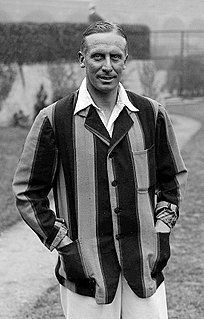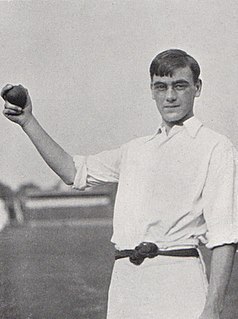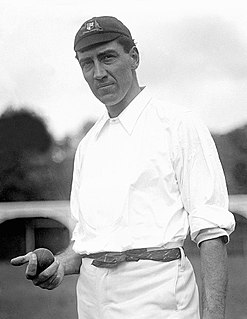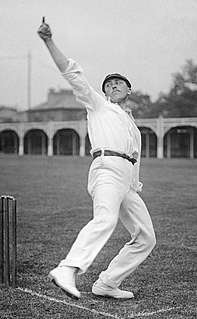Gordon Cathcart Campbell (4 June 1885 – 13 August 1961) was an Australian cricketer active from 1909 to 1915 who played for South Australia.
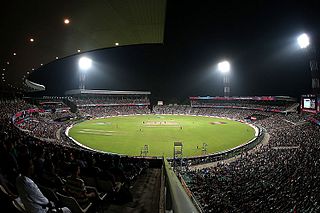
Cricket is a bat-and-ball game played between two teams of eleven players on a field at the centre of which is a 20-metre (22-yard) pitch with a wicket at each end, each comprising two bails balanced on three stumps. The batting side scores runs by striking the ball bowled at the wicket with the bat, while the bowling and fielding side tries to prevent this and dismiss each player. Means of dismissal include being bowled, when the ball hits the stumps and dislodges the bails, and by the fielding side catching the ball after it is hit by the bat, but before it hits the ground. When ten players have been dismissed, the innings ends and the teams swap roles. The game is adjudicated by two umpires, aided by a third umpire and match referee in international matches. They communicate with two off-field scorers who record the match's statistical information.

The South Australia cricket team, named West End Redbacks, nicknamed the ’Southern Redbacks’, is an Australian men's professional first class cricket team based in Adelaide, South Australia. The Redbacks play their home matches at Adelaide Oval and are the state cricket team for South Australia, representing the state in the Sheffield Shield competition and the limited overs Ryobi One-Day Cup. Their Ryobi One-Day Cup uniform features a red body with black sleeves. They are known as the West End Redbacks due to a sponsorship agreement with West End. The Redbacks formerly competed in the now-defunct KFC Twenty20 Big Bash, but were succeeded by the Adelaide Strikers in 2011 because this league was replaced with the Big Bash League.
Contents
Campbell was born in Myrtle Bank, South Australia and died in Woodville South, South Australia. He appeared in 23 first-class matches as a right-handed batsman who kept wicket. He scored 497 runs with a highest score of 43 and held 28 catches with 20 stumpings.
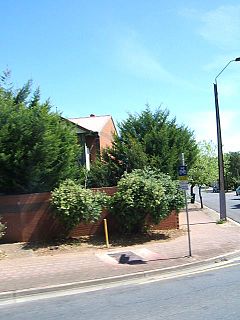
Myrtle Bank is a suburb of Adelaide, South Australia in the City of Unley. The suburb is named after a property near the foothills built in 1842 by William Sanders (1801–1880), who arrived in South Australia in 1838. He named the premises 'Myrtle Bank', because his friend James Gall of Trinity living in Edinburgh had a fine property of the same name. The property passed through the hands of Capt. William Elder, brother of Sir Thomas Elder, before being purchased in 1848 by William Ferguson (1809–1892), who built on the original house and lived there with his family until he died.
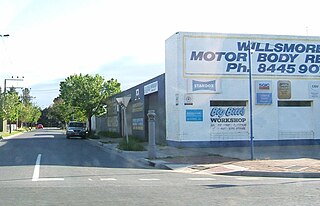
Woodville South is a suburb of Adelaide, South Australia. It lies within the City of Charles Sturt.
First-class cricket is an official classification of the highest-standard international or domestic matches in the sport of cricket. A first-class match is of three or more days' scheduled duration between two sides of eleven players each and is officially adjudged to be worthy of the status by virtue of the standard of the competing teams. Matches must allow for the teams to play two innings each although, in practice, a team might play only one innings or none at all.
He toured North America with an Australian team from May to September 1913, a tour of 54 matches including five first-class matches. [1] He was selected in the Australian team which was to tour South Africa in 1914-15 as one of the two wicket-keepers, as well as the manager and third selector; [2] but war prevented the tour.
During the First World War, he served in the First Australian Imperial Force (1st AIF) with the rank of major and, after the war ended, Campbell was appointed by the Australian Board of (Cricket) Control as its representative in dealings with the AIF Sports Control Board about the proposed AIF team which was formed out of military personnel as the Australian Imperial Force Touring XI.

World War I, also known as the First World War or the Great War, was a global war originating in Europe that lasted from 28 July 1914 to 11 November 1918. Contemporaneously described as "the war to end all wars", it led to the mobilisation of more than 70 million military personnel, including 60 million Europeans, making it one of the largest wars in history. It is also one of the deadliest conflicts in history, with an estimated nine million combatants and seven million civilian deaths as a direct result of the war, while resulting genocides and the 1918 influenza pandemic caused another 50 to 100 million deaths worldwide.

The First Australian Imperial Force was the main expeditionary force of the Australian Army during World War I. It was formed on 15 August 1914, following Britain's declaration of war on Germany, initially with a strength of one infantry division and one light horse brigade. The infantry division subsequently fought at Gallipoli between April and December 1915, being reinforced by a second division which was later raised, as well as three light horse brigades. After being evacuated to Egypt the AIF was expanded to five infantry divisions, which were committed to the fighting in France and Belgium along the Western Front in March 1916. A sixth infantry division was partially raised in 1917 in the United Kingdom, but was broken up and used as reinforcements following heavy casualties on the Western Front. Meanwhile, two mounted divisions remained in the Middle East to fight against Turkish forces in the Sinai and Palestine.
Major is a military rank of commissioned officer status, with corresponding ranks existing in many military forces throughout the world.

